Unveiling PC Power Draw Mysteries
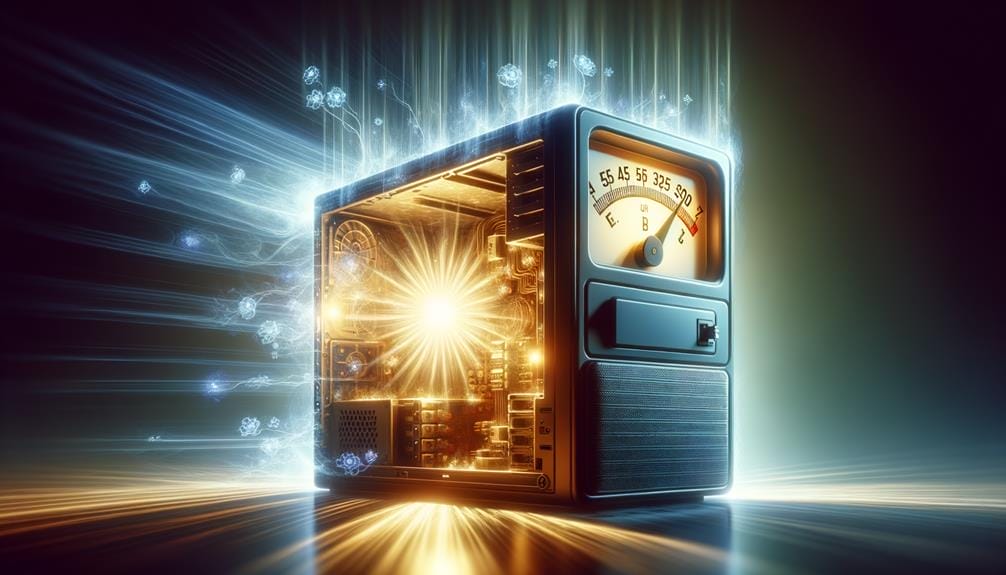
Have you ever considered the impact that the subtleties of your computer’s energy usage have on your everyday interactions with it? Picture this as a problem to be deciphered, with each element and your usage pattern playing a role in the bigger picture.
As you peel back the layers of power consumption, you'll uncover valuable insights that can optimize your PC's performance and reduce your energy costs.
But how do you begin unraveling this mystery? Understanding the intricacies of power draw and its implications will not only empower you to make informed decisions but also shed light on the often overlooked aspect of PC ownership.
Key Takeaways
- PC power supplies and consumption are measured in wattage, while Uninterruptible Power Supplies (UPS) are measured in VA, which is equivalent to wattage.
- Power efficiency affects power bills, excess heat, and noise generated by the Power Supply. A more efficient Power Supply runs cooler and quieter.
- Power consumption for content creation and rendering PCs depends on factors such as CPU power, RAM capacity, storage type, and graphics card power.
- Gaming PCs require a powerful single-core CPU, moderate RAM capacity, solid-state storage, and the power consumption is influenced by CPU and GPU overclocking.
Understanding PC Power Consumption
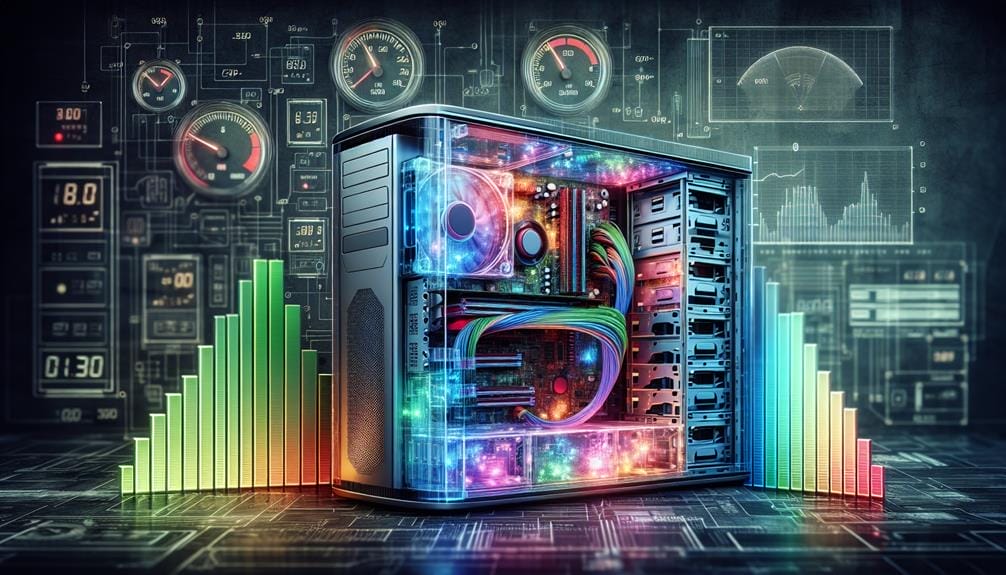
Understanding PC power consumption is crucial for optimizing your system's performance and minimizing energy costs. PC power efficiency is influenced by various factors affecting power consumption.
The efficiency of your power supply directly impacts your power bills, excess heat, and noise generated. Electricity conversion and component heat contribute to power loss, with approximately 10-20% of electricity being lost to inefficiencies and heat.
Content creation and rendering PCs require powerful multi-core CPUs, high RAM capacity, and NVMe solid-state storage, impacting power consumption. Gaming PCs, on the other hand, demand powerful single-core focused CPUs, moderate RAM capacity, and varying graphics card power.
Meanwhile, office PCs necessitate high-value, multi-core CPUs, low to mid RAM capacity, and integrated or low-power GPUs.
Checking your PC's power consumption and selecting the appropriate power supply are essential steps towards efficient power management.
Power Requirements for Content Creation PCs
To optimize the performance and power efficiency of content creation PCs, it is essential to carefully assess the power requirements of the system components. Utilizing energy-efficient components can significantly impact the power consumption of your PC, directly influencing its performance. The table below outlines the power requirements for content creation PCs:
| Component | Power Requirement | Impact on PC Performance |
|---|---|---|
| Multi-core CPU | High | Allows for faster rendering and multitasking |
| High RAM capacity | Significant | Enables handling of larger projects effectively |
| NVMe solid-state storage | Moderate to High | Improves project loading and data transfer speeds |
| Graphics card | Varied | Influences rendering and graphical performance |
Carefully selecting energy-efficient components can lead to a more power-efficient system, ensuring optimal performance for content creation and rendering tasks.
Power Requirements for Gaming PCs
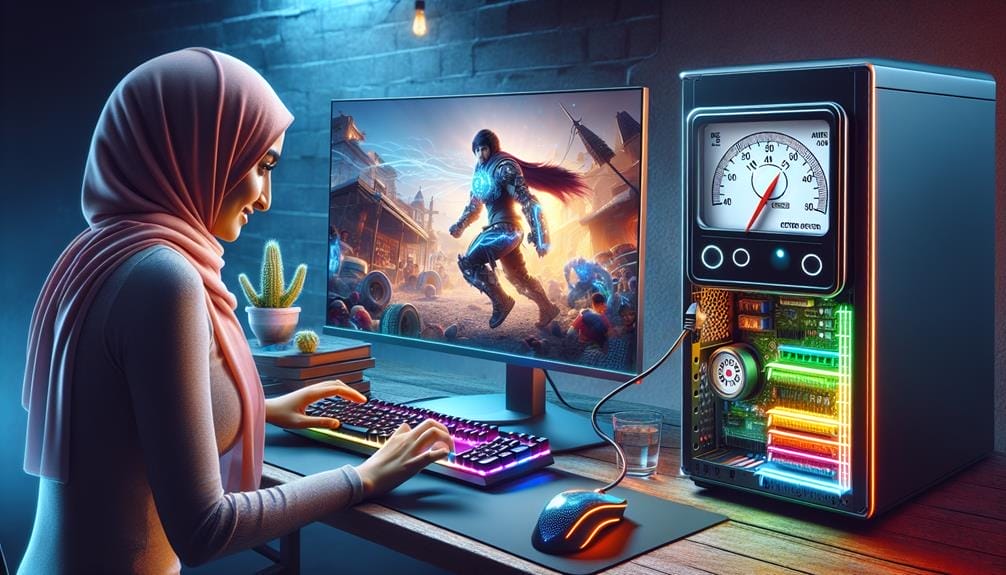
Optimizing the power efficiency of gaming PCs is crucial, as it directly impacts the system's performance and overall capability to handle high-demand gaming tasks.
Gaming PC power usage varies based on components, with the CPU and GPU being the primary power consumers. A high-performance, single-core focused CPU, paired with a potent graphics card, increases power consumption.
Moderate RAM capacity and solid-state storage are sufficient for gaming, contributing to a balanced power utilization. Overclocking the CPU and GPU can significantly increase power demands.
When checking power consumption, consider using tools like Alex's guide or Outervision. Determining the appropriate power supply wattage is essential, with high-end gaming PCs often requiring over 500 Watts.
Understanding power requirements for gaming PCs ensures optimal performance while managing power consumption effectively.
Power Requirements for Office PCs
When selecting components for office PCs, carefully consider the power requirements to ensure efficient and reliable performance.
Here are some energy saving tips and power efficiency benefits to keep in mind:
- High-value, multi-core CPU: Opt for a CPU that balances performance and power efficiency for office tasks.
- Low to mid RAM capacity: Choose RAM capacity that meets the demands of your office applications without unnecessary power consumption.
- HDD or solid-state storage: Select storage based on project scale to avoid overconsumption of power.
- Integrated graphics (iGPU) or low-power GPUs: Use GPUs that are tailored to office tasks to minimize power usage.
Methods for Checking Power Consumption
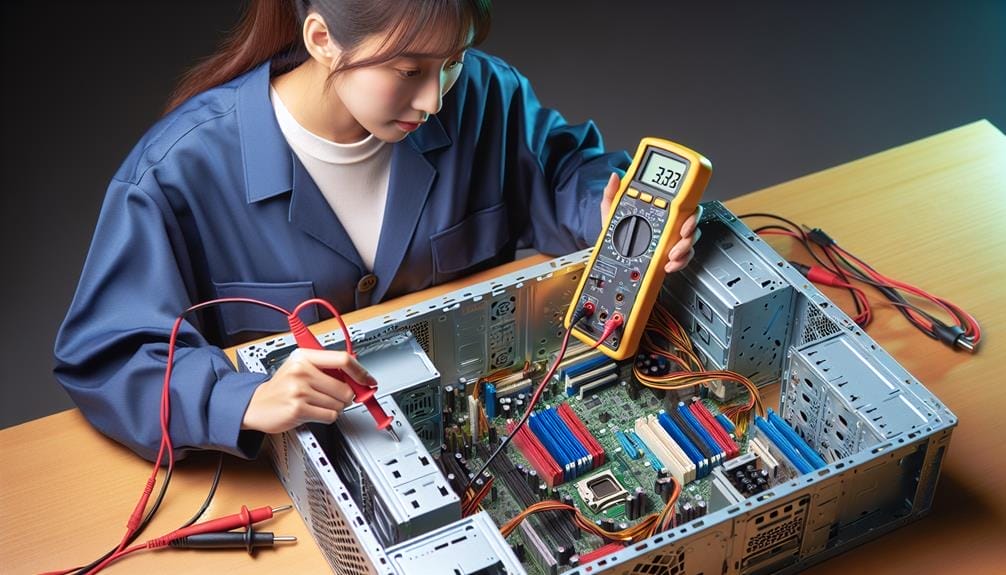
When selecting components for office PCs, carefully consider the power requirements to ensure efficient and reliable performance. Assessing power consumption accurately is essential for optimizing the performance and efficiency of your PC setup.
To measure power consumption, use methods like Alex's guide on How To Check Your PC's Power Consumption or rely on Outervision, a reliable source for power consumption checking. Understanding your PC's power consumption aids in upgrades or new builds, and determines the wattage needed for your power supply.
Additionally, Jerry's Power Supply Buying Guide provides step-by-step assistance in selecting a PSU. Monitoring power usage benefits by helping you anticipate power bill impacts and ensuring stable power delivery, especially in areas with poor infrastructure or frequent blackouts.
Selecting the Right Power Supply
To ensure optimal performance and reliability of your PC setup, selecting the right power supply is crucial for efficient power delivery and hardware protection. When choosing a power supply, consider the following:
- Calculate Power Efficiency: Look for power supplies with high efficiency ratings, such as 80 Plus Bronze, Silver, Gold, or Platinum, to minimize power loss and reduce electricity bills.
- Impact on System Performance: A well-matched power supply ensures stable voltage regulation, contributing to system stability and longevity. It also prevents potential damage to sensitive components.
- Consider Future Upgrades: Anticipate power requirements for potential future upgrades and select a power supply with sufficient headroom to accommodate additional components.
- Compatibility and Form Factor: Ensure the power supply's physical dimensions fit your PC case and that it provides the necessary connectors for your components.
Importance of Uninterruptible Power Supplies
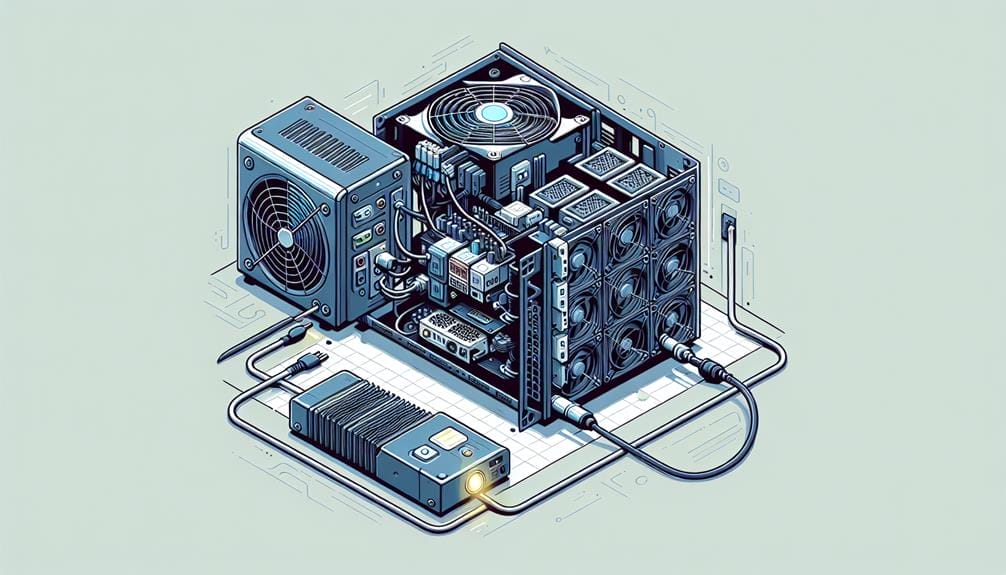
To ensure the stability and longevity of your PC setup, integrating an uninterruptible power supply (UPS) is imperative.
A UPS offers benefits of power efficiency by regulating power fluctuations, ensuring smooth and consistent power delivery to your PC.
Power spikes, common during electrical storms or due to grid issues, can severely impact your PC's performance and even cause permanent damage. The UPS acts as a barrier, safeguarding your PC from these spikes and outages.
It ensures that your hardware receives a steady and clean power supply, preserving its long-term health.
In areas with poor infrastructure and frequent blackouts, a UPS becomes even more crucial, providing a reliable shield against random power disruptions.
Therefore, incorporating a UPS into your PC setup is essential for maintaining optimal performance and protecting your investment.
Conclusion
Now that you have a better understanding of PC power draw, you can make informed decisions about your power supply and energy usage.
Whether you're a content creator, gamer, or office user, knowing your PC's power requirements is essential for optimizing performance and longevity.
By checking power consumption and selecting the right power supply, you can take control of your PC's energy usage and ensure it meets your needs.
Don't let the mysteries of PC power draw hold you back – take charge now.

